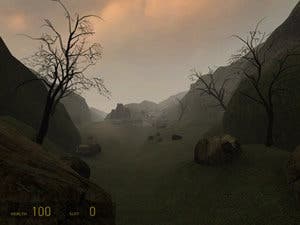Alt Mod Scene
Modding things differently.
The past couple of years have seen a decline in the number of mods finding their way to completion. Partly this is because of the demanding nature of host games, such as the graphically complex Crysis or Unreal Tournament III, and partly it's because of the indie gaming boom.
Folks who might otherwise have worked on mods are making their own lo-fi games, or grabbing free engines like Unity or UDK to do what modding always previously provided, which was the opportunity to make something from scratch with the leg-up of engine tech.
There is, however, another positive and interesting trend in the contemporary modding scene, which is in creating mods that are unexpected, unusual, and dealing with subject matter that is far away from the norm of crosshairs, weapon-renders, or quirky physics.
There are two people I see as the pioneers, or at least frontiersmen, in this particular area of offbeat modding. One is Robert "Campaignjunkie" Yang, and the other is TheChineseRoom's Daniel Pinchbeck.
What is unique and significant about the work of both these men is that their mods explore intellectual and emotional subject matters, rather than tradition martial or tactical topics for modding.

Both modders rely on the ease with which Valve's Source engine can be modified and repurposed for non-violent experiences, and both men have unusual reasons for creating the mods they did.
Most important of all, both seem to be inspiring a wave of experimental mods. (Possibly including the intriguing Velociraptor Job Interview Simulator Pro.)
Yang's "Radiator" episodes are, of course, what I'm talking about in here. This is the work of a mature modder - Yang has been working on modding since he picked up StarCraft aged 13, and he's now using mods to tackle subjects beyond that of extending the lifetime of his favourite RTS.
Radiator is a series of single-player mods, each focused on a limited, non-violent scenario. Each has a peculiar poignancy in the way it deals with emotional subject matter, and each is oddly beautiful. They are capsule stories, nano-takes told in game form.

"Volume 1 is about the relationship between two men," explains Yang. It's about "the pain they cause each other and how one might go about dealing with that."
Yang says that he has had to find ways to explain this stuff to non-gamers, but it seems useful to everyone: "I usually focus on the audience aspect of it: it's an experiment to see if Gatorade-drinking men who make heads explode will enjoy a discourse on memory, identity and sexuality... and it turns out a lot of them do, as long as you're not preaching."
As it turns out, the feedback to Yang's project from the game-literature community was pretty diverse, and not always in a good way. "Games journalists are (usually) hardcore gamers with quirky sensibilities, so this is pretty much right up their alley," says Yang.
"Destructoid had a weird (in my view) perspective on it, disliking how my mod implies that lying in a relationship might not be all that bad - and, well, if you've never questioned whether honesty is always the best policy in a relationship, I'd argue that you've never been in a situation where honesty really mattered."

The response from the wider community was rather less encouraging, with people criticising Yang's decision to include gay characters. Subsequently he has been motivated to speak out about homophobia in the gaming community.
"When I talk about homophobia, I'm not necessarily referring to xSpineExplodRx calling me a faggot in Halo 3," says Yang, "I'm talking about really intelligent people in these gamer communities dressing up their homophobia as design criticism: 'oh in Radiator it ruins the immersion' - whatever immersion means these days! - 'into a player character when I find out so and so is gay.' I find the intellectualisation of homophobia to be much more disturbing."








